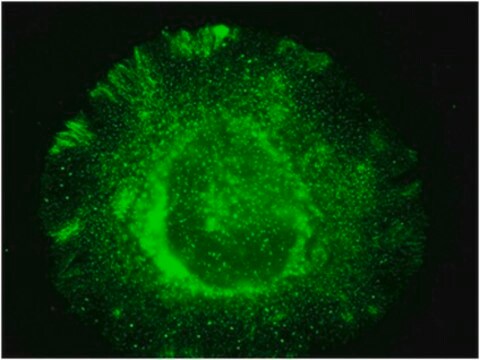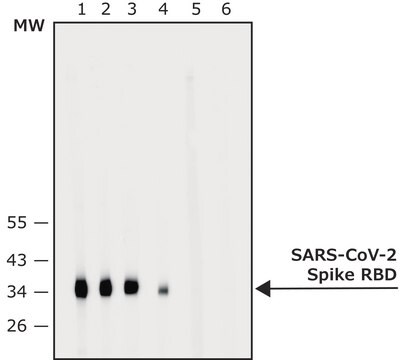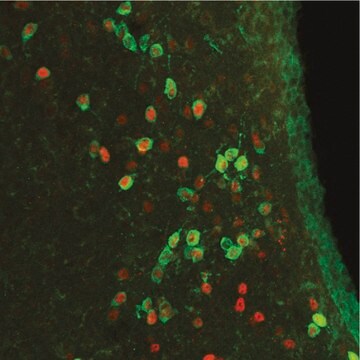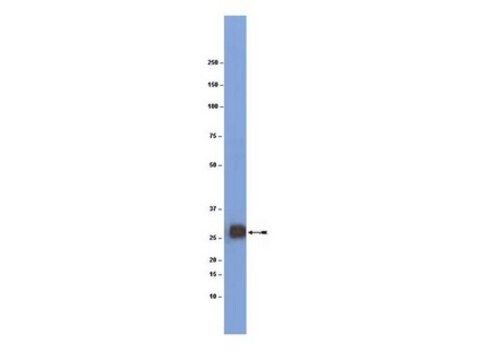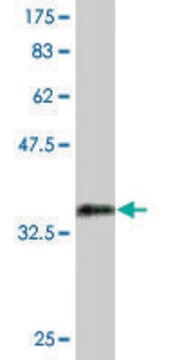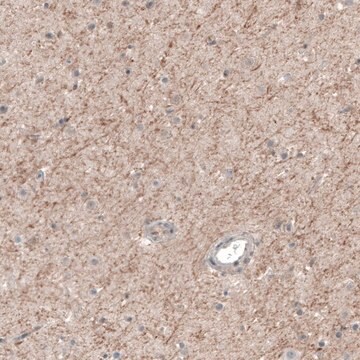推荐产品
生物源
mouse
品質等級
抗體表格
culture supernatant
抗體產品種類
primary antibodies
無性繁殖
10A8.1, monoclonal
物種活性
human
技術
immunohistochemistry: suitable
western blot: suitable
同型
IgG2bκ
NCBI登錄號
UniProt登錄號
運輸包裝
dry ice
目標翻譯後修改
unmodified
基因資訊
human ... NOX4(50507)
一般說明
NADPH oxidase 4 (UniProt Q9NPH5; also known as Kidney oxidase-1, Kidney superoxide-producing NADPH oxidase, KOX-1, Renal NAD(P)H-oxidase) is encoded by the NOX4 (also known as RENOX) gene (Gene ID 50507) in human. NOX4 belongs to the family of NADPH oxidases that modulate redox-dependent cellular signalling pathways via intracellular reactive oxygen species (ROS) generation. Seven family members have been identified in mammals (NOX1–5 and DUOX1/2) with member-specific cellular distribution, intracellular location, mechanisms of action and types of ROS produced. NOX4 produces predominantly H2O2, and is widely expressed in many cell types and adult tissues, including kidney, liver, heart and aorta. NOX4 plays an important role in homocysteine (Hcy) metabolism, which in turns is a determining factor that impacts on defence against environmental toxins. Nox-knocout in mice results in significantly decreased total plasma Hcy levels, causing markedly increased susceptibility to acetaminophen- (APAP-, paracetamol-) induced hepatoxicity as a result of significantly decreased cysteine production and hepatic GSH stores. Human NOX4 is a six-transmembrane (a.a. 17-37, 63-83, 104-124, 155-175, 189-209, 425-445) protein, having both its N- and C-terminal ends at the cytoplasmic side (a.a. 1-16 & 446-578).
特異性
Immunogen construct region is present in human NOX4 spliced isoform 1, 2 (Nox4A), and 8, missing in isoform 5 (Nox4C), 7, and 9, partially truncated in isoform 3 (Nox4E), 4 (Nox4D), and 6 (Nox4B) reported by UniProt (Q9NPH5).
免疫原
Epitope: Third extracellular loop.
GST-tagged recombinant protein corresponding to a fragment from the third extracellular loop of human NOX4.
應用
Immunohistochemistry Analysis: A 1:50 dilution from a representative lot detected NOX4 in human kidney, pancreas, and testis tissue sections.
Research Category
Apoptosis & Cancer
Apoptosis & Cancer
Research Sub Category
Toxicology & Drug Resistance
Toxicology & Drug Resistance
This Anti-NOX4 Antibody, clone 10A8.1 is validated for use in Western Blotting, Immunohistochemistry for the detection of NOX4.
品質
Evaluated by Western Blotting in human kidney tissue lysate.
Western Blotting Analysis: A 1:1,000 dilution of this antibody detected NOX4 in 10 µg of human kidney tissue lysate.
Western Blotting Analysis: A 1:1,000 dilution of this antibody detected NOX4 in 10 µg of human kidney tissue lysate.
標靶描述
~67 kDa observed. 66.93 kDa (isoform 1), 58.41 kDa (isoform 2; Nox4A), 64.10 kDa (isoform 8), 27.63 kDa (isoform 3; Nox4E), 31.81 kDa (isoform 4; Nox4D), 62.75 kDa (isoform 6; Nox4B) calculated.
外觀
Unpurified.
Mouse monoclonal IgG2bκ hybridoma culture supernatant without preservatives.
儲存和穩定性
Stable for 1 year at -20°C from date of receipt.
Handling Recommendations: Upon receipt and prior to removing the cap, centrifuge the vial and gently mix the solution. Aliquot into microcentrifuge tubes and store at -20°C. Avoid repeated freeze/thaw cycles, which may damage IgG and affect product performance.
Handling Recommendations: Upon receipt and prior to removing the cap, centrifuge the vial and gently mix the solution. Aliquot into microcentrifuge tubes and store at -20°C. Avoid repeated freeze/thaw cycles, which may damage IgG and affect product performance.
其他說明
Concentration: Please refer to lot specific datasheet.
免責聲明
Unless otherwise stated in our catalog or other company documentation accompanying the product(s), our products are intended for research use only and are not to be used for any other purpose, which includes but is not limited to, unauthorized commercial uses, in vitro diagnostic uses, ex vivo or in vivo therapeutic uses or any type of consumption or application to humans or animals.
未找到合适的产品?
试试我们的产品选型工具.
儲存類別代碼
10 - Combustible liquids
水污染物質分類(WGK)
WGK 2
null
Jin Sun Hwang et al.
Investigative ophthalmology & visual science, 61(4), 21-21 (2020-04-18)
Human corneal endothelial cells (hCECs) have limited regenerative capacity in vivo. Reduced hCEC density results in bullous keratopathy requiring corneal transplantation. This study reveals the role of transcription factor 4 (TCF4) in hCEC diseases and suggests that TCF4 may be
Manoj Sonavane et al.
PloS one, 15(11), e0242174-e0242174 (2020-11-10)
Nicotinamide adenine dinucleotide (NAD+), the essential cofactor derived from vitamin B3, is both a coenzyme in redox enzymatic processes and substrate in non-redox events; processes that are intimately implicated in all essential bioenergetics. A decrease in intracellular NAD+ levels is
我们的科学家团队拥有各种研究领域经验,包括生命科学、材料科学、化学合成、色谱、分析及许多其他领域.
联系技术服务部门
